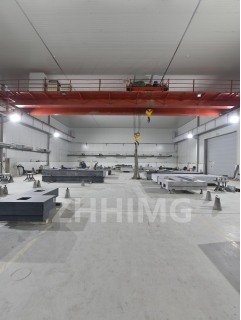Granite is a natural material that has been used for centuries as a building material. In recent years, it has gained popularity as a material for machine bases in various industries, such as the automotive and aerospace industries. The advantages and disadvantages of granite machine base must be considered before deciding whether to use it in manufacturing processes. In this article, we will discuss the advantages and disadvantages of using granite machine bases in the automotive and aerospace industries.
Advantages of Granite Machine Bases
1. Stability
Granite is a dense, hard material that has very low thermal expansion. This makes it ideal for use in machine bases that require high levels of stability. The stability of granite machine bases ensures accuracy in the manufacture of complex components.
2. Durability
Granite is an extremely durable material that can withstand the stresses and strains of high-speed machining. It is also resistant to wear and tear, making it ideal for use in high-volume production environments. The durability of granite machine bases ensures that they have a long lifespan and require less maintenance.
3. Vibration Dampening
Granite has excellent vibration-dampening characteristics. This property reduces the amount of vibration that is transferred to the machining spindle, resulting in better surface finishes and reduced tool wear. This advantage is particularly relevant in the aerospace industry, where delicate components require a high degree of precision.
4. Thermal Stability
Granite has excellent thermal stability, which makes it less susceptible to deformations caused by temperature changes. This stability ensures that the machine base remains stable during the machining process, maintaining the accuracy of the finished component.
Disadvantages of Granite Machine Bases
1. Cost
Granite is a premium material that is expensive to quarry and produce. This makes granite machine bases more costly than other materials such as cast iron or welded steel. However, the cost of granite machine bases is offset by their longevity and accuracy, making them a cost-effective solution in the long run.
2. Weight
Granite is a heavy material, which makes machine bases made from it difficult to move or reposition. This disadvantage is particularly relevant in industries where machines need to be moved frequently. However, the weight of granite machine bases is also an advantage since it contributes to their stability.
3. Machinability
Granite is a hard material that can be challenging to machine. This difficulty makes it more costly to shape and finish granite machine bases. However, modern computer-controlled machining tools can overcome this disadvantage by precisely shaping the material.
Conclusion
Granite machine bases have various advantages and disadvantages. However, in many situations, their advantages outweigh their disadvantages. The stability, durability, vibration-dampening, and thermal stability features of granite make it an ideal material for machine bases in the automotive and aerospace industries. Although granite is more expensive than other materials, its long lifespan and accuracy make it cost-effective in the long run. Therefore, it is clear that granite is a good choice for machine base construction.
Post time: Jan-09-2024

